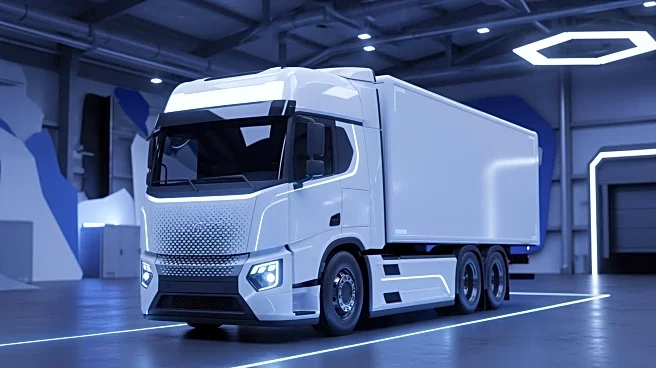What's Happening?
Mercedes-Benz CharterWay has introduced the eActros 600, an all-electric truck, at the BVL Supply Chain CX logistics congress in Berlin. The vehicle boasts a range of up to 500 kilometers, powered by a 621kWh
battery. CharterWay, a leasing and mobility company, offers integrated mobility solutions for fleet operators and logistics companies, including rental models from daily hire to long-term fleet use. The eActros 600 is part of CharterWay's effort to provide efficient and sustainable access to electric mobility, with transparent cost structures aimed at minimizing investment risks. The company combines financing, insurance, and service elements into a single offering, facilitating the adoption of electric vehicles in logistics operations.
Why It's Important?
The introduction of the eActros 600 represents a significant step towards sustainable transport solutions in the logistics industry. As companies face increasing pressure to reduce emissions, the availability of electric trucks like the eActros 600 offers a viable alternative to traditional diesel-powered vehicles. This development could lead to reduced environmental impact and operational costs for logistics companies, as electric vehicles typically have lower maintenance and fuel expenses. The move aligns with broader industry trends towards electrification and sustainability, potentially influencing other companies to adopt similar strategies.
What's Next?
CharterWay's presentation of the eActros 600 at the BVL Supply Chain CX congress may prompt further interest and adoption of electric trucks among logistics companies. As the industry continues to evolve, stakeholders might explore additional partnerships and innovations to enhance electric mobility solutions. The success of the eActros 600 could encourage Mercedes-Benz and other manufacturers to expand their electric vehicle offerings, further accelerating the transition to sustainable transport.
Beyond the Headlines
The shift towards electric trucks like the eActros 600 could have broader implications for urban planning and infrastructure development. As electric vehicles become more prevalent, cities may need to invest in charging stations and grid enhancements to support increased demand. Additionally, the transition to electric mobility could influence regulatory policies, with governments potentially offering incentives to encourage adoption and reduce carbon footprints.












